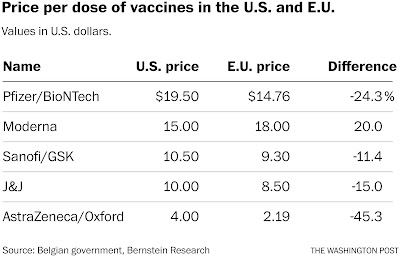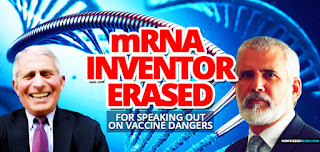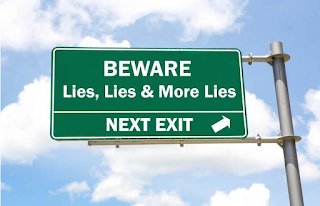Who Are The 'Disinformation' Enemies of Truth?
How Much Does The Pfizer Vaccine Cost Per Dose?
In initial deals with the U.S. government, Pfizer and BioNTech's vaccine costs $19.50 per dose, compared with $15 for Moderna's shot, $16 for Novavax's program, $10 for Johnson & Johnson's vaccine and $4 for AstraZeneca's.
The EU is also paying less for the Pfizer-BioNTech vaccine than the U.S., $14.70 per dose versus $19.50, according to figures reported in BMJ. On the other hand, the U.S. is paying less for the Moderna vaccine (about $15) than the EU (about $18), according to the BMJ piece. The contribution governments have made toward vaccine research is the explanation for the price differences. Moderna is charging the U.S. less for its vaccine because the U.S. government funded research that led to the vaccine’s development. Similarly, the EU supported research that led to the development of the Pfizer-BioNTech vaccine, thus the lower price for that vaccine for the EU.
So far, governments around the world have been the only purchasers of the COVID-19 vaccines, so the price has been set by government contracts. But different countries are paying different prices. South Africa, for example, reportedly paid $5.25 per dose for the Oxford-AstraZeneca vaccine in January, more than twice the price of $2.15 per dose paid by the European Union (EU), according to a report in BMJ. The South African government has announced that it is holding back on administering that vaccine because it may be less effective against the country’s namesake variant.
First to receive emergency use authorization in the United States, the Pfizer shot has become the world’s most popular, with 3.5 billion doses purchased. Sales could double in 2022, according to projections.
But the rapid proliferation of the vaccine, under contracts negotiated between the company and governments, has unfolded behind a veil of strict secrecy, allowing for little public scrutiny of Pfizer’s burgeoning power, even as demand surges amid new negotiations for one of the world’s most sought-after products.
A report released Tuesday by Public Citizen, a consumer rights advocacy group that gained access to a number of leaked, unredacted Pfizer contracts, sheds light on how the company uses that power to “shift risk and maximize profits,” the organization argues.
The Manhattan-based pharmaceutical giant has maintained tight levels of secrecy about negotiations with governments over contracts that can determine the fate of populations. The “contracts consistently place Pfizer’s interests before public health imperatives,” said Zain Rizvi, the researcher who wrote the report.
Public Citizen found common themes across contracts, including not only secrecy but also language to block donations of Pfizer doses. Disputes are settled in secret arbitration courts, with Pfizer able to change the terms of key decisions, including delivery dates, and demand public assets as collateral.
Sharon Castillo, a spokeswoman for Pfizer, said that confidentiality clauses were “standard in commercial contracts” and “intended to help build trust between the parties, as well as protect the confidential commercial information exchanged during negotiations and included in final contracts.”
Both Pfizer and Moderna, another U.S. company that developed a vaccine using breakthrough mRNA technology, are facing pressure from critics who accuse them of building a “duopoly.” Although Pfizer did not accept government funding through the vaccine development program called Operation Warp Speed, it received huge advance orders from the United States. It opposed an intellectual property waiver that could have meant the sharing of its technology.
Experts who reviewed the terms of contracts with foreign governments suggested that some demands were extreme. In contracts reached with Brazil, Chile, Colombia and the Dominican Republic, those states forfeited “immunity against precautionary seizure of any of [their] assets.”
“It’s almost as if the company would ask the United States to put the Grand Canyon as collateral,” said Lawrence Gostin, a professor of public health law at Georgetown University.
The company rejected that logic. “Pfizer has not interfered and has absolutely no intention of interfering with any country’s diplomatic, military, or culturally significant assets,” Castillo said. “To suggest anything to the contrary is irresponsible and misleading.”
Some contract demands appear to have slowed vaccine rollouts in countries. At least two countries walked away from negotiations and publicly criticized the company’s demands. However, both later reached agreements with Pfizer.
Aspects of the contracts are not uncommon, including the reliance on arbitration courts and clauses designed to give companies legal protection. Pfizer’s price for its vaccine, as low as $10 per dose in Brazil, appeared to be lower than some competitors’ prices.
“Pharma companies have concerns,” said Julia Barnes-Weise, director of the Global Healthcare Innovation Alliance Accelerator. “One of them is, especially for a not-yet-approved vaccine, that they could be held liable for any injury that that vaccine seems to have caused.”
Secret contracts
Pfizer has formalized 73 deals for its coronavirus vaccine. According to Transparency International, a London-based advocacy group, only five contracts have been formally published by governments, and these with “significant redactions.”
“Hiding contracts from public view or publishing documents filled with redacted text means we don’t know how or when vaccines will arrive, what happens if things go wrong and the level of financial risk buyers are absorbing,” said Tom Wright, research manager at the Transparency International Health Program.
Much of what is known about Pfizer’s contracts has come out in leaks, often through journalism from local outlets or international ones, including the Bureau of Investigative Journalism.
Public Citizen analyzed an unredacted draft agreement between the company and Albania, as well as unredacted final documents from Brazil, Colombia, the Dominican Republic, Peru and the European Commission. Redacted documents published by Chile, the United States and Britain provide further context, though they are missing key details.
The contract reached with Brazil prohibits the government from making “any public announcement concerning the existence, subject matter or terms of [the] Agreement” or commenting on its relationship with Pfizer without the prior written consent of the company.
“This is next-level stuff,” said Tahir Amin, an intellectual property lawyer who co-founded I-Mak, a nonprofit global health organization.
Pfizer exerted control over the supply of vaccine doses after contracts were signed. The Brazilian government was restricted from accepting donations of Pfizer doses or making its own donations. Pfizer also included clauses in contracts with Albania, Brazil and Colombia that it could unilaterally change delivery schedules in the case of shortages.
In contracts with Brazil, Chile, Colombia, the Dominican Republic and Peru, governments were required to sign a document that says each “expressly and irrevocably waives any right of immunity which either it or its assets may have or acquire in the future.” The first four were also required to waive immunity against “precautionary” seizure of their assets.
Public Citizen found contracts that required governments “‘to indemnify, defend and hold harmless Pfizer’ from and against any and all suits, claims, actions, demands, damages, costs and expenses related to vaccine intellectual property.”
An opaque giant
Pfizer has not experienced the same level of public scrutiny as Moderna, which has been accused of price-gouging and delaying deliveries. Analytics firm Airfinity this week predicted Pfizer will sell $54.5 billion worth of coronavirus vaccine next year, almost twice the value of Moderna’s sales.
One official from a country in the midst of negotiations with Pfizer, who was not authorized to speak on the matter, said that the country found Pfizer difficult to negotiate with but reliable in the delivery of vaccine doses.
Like Moderna’s, Pfizer’s vaccine has been found to be highly effective against the delta variant of the coronavirus and to provide long-lasting immunity. From the leaked documents, Pfizer appears to have offered lower prices for its vaccine to poorer countries that had less leverage.
Castillo said that Pfizer had committed to a tiered pricing approach, with wealthier nations paying about the cost of a takeout meal per dose and lower-middle-income countries offered prices at a not-for-profit price. Some 99 million doses had reached low- and lower-middle-income countries so far, and the company expects “substantial increase in shipments to these countries through the end of the year.”
Contract terms related to sovereign immunity may have been an attempt to cover for some risks over which the company has little control, including the use of new, unapproved vaccines in partner countries where the company has little oversight over storage and distribution. Pfizer may have been worried about opportunistic lawsuits in countries where it had not filed patents, Barnes-Weise said.
Some countries, including the United States, have laws that provide indemnification to vaccine manufacturers, but most do not.
However, Transparency International argued that at least four contracts or drafts it examined went “much further” than other vaccine developers, with “more of the risk onto national governments, and away from the developer, even if missteps are made by the developer or supply chain partners, and not just if there is a rare adverse effect of the vaccines.”
Suerie Moon, co-director of the global health center at the Graduate Institute of International and Development Studies in Geneva, said that restrictions on donations were “appalling” and “counter to the goal of getting vaccines as quickly as possible to those who need them.”
Castillo said Pfizer is not currently pursuing legal action against any government related to its coronavirus vaccine.
At least two countries that initially backed out of negotiations with Pfizer later returned. In January, Brazil publicly said Pfizer was insisting on “unfair and abusive” contractual terms, pointing to the confidentiality clauses. Just months later, Brazil signed a $1 billion contract with the drug giant for 100 million doses. Public Citizen says that the signed contract, later leaked, contained many of the provisions that Brazil once opposed.
Argentina also rejected early negotiations with Pfizer, with the country’s former health minister publicly saying the company “behaved very badly” and was making demands that did not comply with Argentine law. The country later agreed to purchase 20 million doses. The unredacted contract has not been released.
Covax, a World Health Organization-backed vaccine-sharing initiative, has purchased only a relatively modest 40 million doses directly from Pfizer, with reports of disputes during subsequent negotiations. Covax later reached an agreement with the United States for Washington to buy and redistribute 500 million Pfizer doses to low-income countries through Covax.
In its report, Public Citizen called on the U.S. government to use its leverage to force Pfizer to take a different approach, including requiring the company to share technology and intellectual property so that other manufacturers can produce the vaccine.
“The global community cannot allow pharmaceutical corporations to keep calling the shots,” Rizvi said. “The Biden administration can step up and balance the scales.”
Fake News Lies Showing Vaccine Efficacy Headlines Compilation
Devolution of COVID vaccine efficacy. pic.twitter.com/Tlm3SAG0OT
— Kelly Bee 🐝 (@ke11ybender) October 15, 2021
FDA Did a Bait and Switch With Pfizer Vaccine
There are currently no fully FDA-approved licensed COVID shots available. All COVID shots remain under federal Emergency Use Authorization, meaning individuals have the “option to accept or refuse” the product. The mainstream media lied also.
On September 22, 2021, the Food and Drug Administration (FDA) sent a follow-up letter to the original approval to Pfizer pharmaceutical company that stated, “having concluded that revising this EUA is appropriate to protect the public health or safety under section 564(g)(2) of the Act, FDA is reissuing the August 23, 2021 letter of authorization in its entirety with revisions incorporated to authorize for emergency use the administration of a single booster dose of COMIRNATY.”
On page 6, footnote 12 of that letter the FDA clearly states, “Although COMIRNATY (COVID-19 Vaccine, mRNA) is approved to prevent COVID-19 in individuals 16 years of age and older, there is not sufficient approved vaccine available for distribution to this population in its entirety at the time of reissuance of this EUA. Additionally, there are no products that are approved to prevent COVID-19 in individuals age 12 through 15, or to provide: an additional dose to the immunocompromised population, or a booster dose to the authorized population described in this EUA” (emphasis added).
On August 23, 2021, the FDA sent an approval letter to Pfizer regarding the BioNTech injection, Comirnaty. The letter states: “Under this license, you are authorized to manufacture the product, COVID-19 Vaccine, mRNA, which is indicated for active immunization to prevent coronavirus disease 2019 (COVID-19) caused by severe acute respiratory syndrome coronavirus 2 (SARS-CoV-2) in individuals 16 years of age and older.”
The FDA did a bait and switch by announcing it approved its “first COVID-19 vaccine” in order to push the “vaccine” mandates and protect the Pfizer pharmaceutical company from legal liability. The Pfizer injection, on the other hand, is still considered experimental under U.S. law.
There is a legal difference between products approved under authorization of emergency use (EUA) compared with those the FDA has fully licensed. The FDA issued another letter for the existing Pfizer shots which confirms they are still under EUA, are not fully approved, and has a liability shield. That means people must be told the risks and benefits, and they have the “option to accept or refuse” the product. The federal Emergency Use Authorization law and the FDA, including the FDA Fact Sheet, state unequivocally that each person has the “option to accept or refuse” the shots.
Therefore:
- All existing Pfizer vials (in the hundreds of millions), remain under the federal Emergency Use Authorization (EUA) (meaning people have the “option to accept or refuse”);
- The third or “booster” Pfizer shot is identical to the above and remains under the EUA with limited use to certain categories of people;
- BioNTech received FDA approval for people ages 16 and above under the name Comirnaty, but there are no Comirnaty doses available in the United States;
- In other words, there is currently NO FDA-approved COVID-19 injection available anywhere in the United States. Every COVID shot in America remains under the EUA law and thus people have the “option to accept or refuse” them; and
- Even when an FDA-approved COVID shot becomes available, individuals are protected by federal law and many state laws from being forced to get these shots based on their sincere religious beliefs or conscience rights.
Liberty Counsel Founder and Chairman Mat Staver said, “The FDA has clearly stated there is currently no fully FDA-approved licensed COVID shot available to the population. The Pfizer injection that is currently available in the U.S. is not FDA approved and remains under emergency use authorization only. That means that people have the option to accept or refuse the shots.”
Liberty Counsel provides broadcast quality TV interviews via Hi-Def Skype and LTN at no cost.
BREAKING: Defending The Republic Sues DOD, FDA & others on behalf of our military who decline vaccination
Vaccines For Kids Potentially More Dangerous than Virus, German Gov’t Reports
According to a safety report published by the Federal Institute for Vaccines and Biomedicines in Germany, the number of reported cases of suspected adverse effects following COVID-19 vaccination in children aged 12 to 17 has now exceeded the total number of COVID-related hospitalizations for children within the same age group since the beginning of the pandemic.
The report, which was published on September 20 by the PEI (Paul-Ehrlich-Institut), a German federal agency and medical regulatory body in charge of promoting drug and vaccine safety, has released new data on COVID-19 vaccines adverse effects, particularly among children aged 12 to 17.
The data, which was collected from the beginning of the vaccination campaign until August 31, shows that 1,228 vaccinated children aged 12 to 17 reported one or several suspected adverse effects following vaccination. This comes only three months after the beginning of the vaccination campaign for that age group, and just two weeks following a recommendation by the STIKO, the German Standing Committee on Vaccination.
By comparison, the total number of children aged 12 to 17 who were admitted to the hospital for COVID-19 between March 2020 and July 2021 is 1,225. In other words, within just 3 months, the number of cases of vaccinated children suffering from potential vaccine-related adverse effects exceeded the number of COVID-related hospitalizations within the same age group over a period of 16 months.
This new data seems to indicate that more children are suffering from the vaccine meant to protect them from COVID-19, than from the virus itself.
The most serious adverse effects reported include heart diseases such as myocarditis and pericarditis, as well as other serious health conditions such as thrombosis, pulmonary embolism, and the Guillain-Barré Syndrome.
Even more concerning are the first reported cases of fatalities following vaccination in that age-group. According to the PEI report, “three of the 1,228 reported cases of adverse effect have resulted in the death of the patients within two to twenty-four days following vaccination with [Pfizer/BioNTech].”
Based on the newly release data, if the vaccination campaign extends to all minors aged 12 to 17, as well as to other age groups, as is currently expected, the total number of vaccine-related deaths among minors could be triple or even four times that of COVID-related deaths in the same age group throughout the whole pandemic. In other words, the vaccines offered to protect children from COVID are potentially more dangerous to children than the virus itself, according to an analysis published by Susan Bonath of RT DE.
The report also showed a significant increase of reported cases of adverse effects in adults, including a staggering increase in severe adverse reactions. Data collected throughout the month of August shows a 15-fold increase with skyrocketing numbers of severe reactions going from 1,094 to 15,122 in just one month. A steady increase in the number of vaccine-related deaths can also be observed.
According to Bonath’s analysis of the report, the total number of reported vaccine-related injuries and deaths over a span of seven months far exceeds that of all other vaccines together over a span of twenty years, from 2000 to 2020, with the number of long-term effects almost four times higher and the number of deaths more than three times higher.
This remarkable discrepancy was pointed out by RT DE editor Florian Warweg at a press conference with the Federal Ministry of Health on September 8. Warweg, who referred at the time to data which is no longer up to date, asked Andreas Deffner, spokesperson of the Federal Health Ministry:
Vaccines for kids potentially more dangerous than COVID, German gov’t report indicateshttps://t.co/d8gYYjg4Xg
— Sabina Walker 😀 Master Appl Science (Neuroscience (@SabinaWalker18) September 26, 2021
Pfizer is Getting Desperate "Third Time's The Charm"

FDA Questions If COVID Boosters Are Even Needed
How do the CDC and the FDA lose public confidence?
1. Announce a booster program on Sept 20 for all at 8 months post-vaccine
2. Change it to 6 months, then 5 months, then back to 8
3. Lack of agreement among the leadership group
4. Have no US national data
5. Announce the program will be "scaled back"
Dr. Janet Woodcock, the acting commissioner of the Food and Drug Administration, and Dr. Rochelle P. Walensky, who heads the Centers for Disease Control and Prevention, warned the White House on Thursday that their agencies may be able to determine in the coming weeks whether to recommend boosters only for recipients of the Pfizer-BioNTech vaccine — and possibly just some of them to start.
Top officials at the Food and Drug Administration and the Centers for Disease Control and Prevention have warned the White House that they may need more time to review data before the Biden Administration can begin introducing COVID-19 booster shots. https://t.co/NGkLnOCapv
— Newsmax (@newsmax) September 3, 2021
The two health leaders made their argument in a meeting with Jeffrey D. Zients, the White House pandemic coordinator. Several people who heard about the session said it was unclear how Mr. Zients responded. But he has insisted for months that the White House will always follow the advice of government scientists, wherever it leads.
In response to the NYT's questions, the White House said it's merely trying to "follow the science". That this statement is blatantly untrue shouldn't require too much explanation. Let's review: pushing for mandatory masks in schools, refusing to accept natural immunity, pushing for vaccine passports etc.
Asked about the meeting, a White House spokesman on Friday said, “We always said we would follow the science, and this is all part of a process that is now underway,” adding that the administration was awaiting a “full review and approval” of booster shots by the F.D.A. as well as a recommendation from the C.D.C.
"When that approval and recommendation are made,” the spokesman, Chris Meagher, said, “we will be ready to implement the plan our nation’s top doctors developed so that we are staying ahead of this virus.”
President Biden has said the plan is for every adult to get a booster shot eight months after you got your second shot, with the president claiming it will end the pandemic faster. Of course, in recent weeks, more doctors have spoken out against booster shots, claiming it would be better for them to go to the developing world, to people who haven't received any jabs, that way it can help protect against the emergence of a new deadlier and more infectious variant.
And they're not alone: while Israel pushes ahead with its plan for booster jabs, the EU's equivalent to the CDC (ECDC) has broken with the Biden Administration saying this week that booster jabs aren't necessary. And senior officials at the FDA have also stepped down over their disagreements about booster jabs.
Advisers to the FDA are expected to discuss two key questions when they meet on Sept. 17 to consider a COVID-19 vaccine booster campaign this fall. The first: is protection from the initial shots waning, and the second: will boosters help?
By moving ahead unilaterally, the White House usurped the CDC and FDA's authority over these types of health-related calls, Reuters added.
"The recommendation shouldn't precede the data, which is what happened here. And that's why people are so upset," said a source close to the FDA advisory panel who was not authorized to speak on the record.
Take a look at this piece of 'news analysis' published by Reuters.
Shares of Moderna skidded lower on the news, as this is the latest sign that real resistance to Biden's booster jabs for all plan is growing.
Dr. Malone Sounds Alarm On Liability Coverage Of Pfizer Vax
Mainstream Media & Big Pharma Have Lied To You Again
— mcm-ct.com (@mcm_ct) August 24, 2021
Popular Posts (All Time)
-
Table of Contents Introduction: Stress, Smoking, and Health The Normotim Effect: A New Hope in Stress Management Lithium Ascorbate:...
-
The coronavirus disease (COVID-19) pandemic has been linked to mental health issues related to disease-induced morbidity and mortality and p...
-
A group of virologists in February 2020 published a letter in The Lancet stating they “overwhelmingly conclude that this coronavirus origina...
-
Former Hunter Biden business partner Tony Bobulinski has confirmed that an email published in the New York Post's bombshell exposé is i...
-
SAMPLE LETTER BELOW 🚨🚨🚨 The secret is NOT to refuse the Jabb.... From a lawyer: If you are being forced to Vax in order to keep your job,...
-
The time is now. As most readers of this substack are now well aware, this is not just about COVID. The Constitution hangs in the balance. P...
-
Comment to ACIP meeting of August 30, 2021 submitted by Steve Kirsch - Executive Director of the COVID-19 Early Treatment Fund stk@treatearl...
-
Klaus Schwab's World Economic Forum Government & WHO Lies Tucker & Malone Discuss The World Economic Forum & It's Young ...
-
2 Sources for this story below . . . Justin Bieber reveals he has Ramsay Hunt syndrome Twitter suspended the VaccineTruth2 account Want to ...
-
Crimes Against Humanity - The PCR Test Fraud and COVID-19 will be the Case of the Century Reiner Fuellmich - Update on Court Case & P...

















